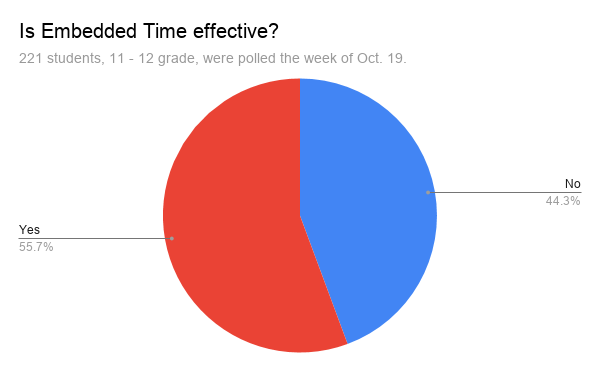Staff Editorial
One of the biggest schedule changes Gabrielino High School has undergone due to the pandemic is the addition of an Embedded Time class on Wednesdays with no other classes occurring that day. Although a slight majority of students, according to an informal Tongva Times survey, agree that the class is helpful, there is still much improvement needed in order to make Embedded Time fully effective in bettering the mental health of all students.

Embedded Time runs from 9 a.m. to 11 a.m. each week. In order to meet the required amount of in-person instruction, all students are assigned to a thirty minute class with their Embedded Time teacher. This is followed by half hour intervention periods during which teachers can meet with specific students who need extra support. The administration asked Wellness Counselor Chris Saporito to send teachers weekly activities to perform with their students during synchronous instruction, in addition to the reading of the weekly bulletin, which A.S.B. now produces as a video.
Current activities include watching wellness videos, answering wellness surveys, and sharing experiences with the rest of the class.
On paper, this plan seems to be ideal. The school reaches the required instruction time, students can take half an hour to de-stress, and the rest of the day is free for completing homework assignments. The class’ sense of community adds to its “safe space” environment, making it ideal for catering to the needs of students who may face issues due to COVID-19.
According to the U.S. National Institutes of Health’s National Library of Medicine, “A loss of routine for many students, social isolation and feelings of loneliness increase the risk of mental illness.”
However, the classes that students are placed in are essentially randomized, with only student grade levels in common. This means that students are expected to open up to a class of near strangers, or worse, with people who they have seen for years but do not feel comfortable sharing with because they do not have enough time together each week to bond. In many cases, the pressure to open up may stress students out instead of allow them to unwind.
“The goal [should be] to provide a safe space where [students] feel safe and connected again,” stated Gabrielino parent and Professor of Counseling for Pasadena Community College Dr. Maribel Morales. “What has worked in the past is when students listen to someone they can relate to.”
Morales explained how allowing students to get to know peers from different grade levels and genders – whom they can identify with – in smaller, more intimate groups, would lead to a stronger community on the virtual campus overall. Upperclassmen being able to give advice to freshmen and sophomores, especially, can encourage the connectivity that many feel has been lost through the Virtual Academy.
As another possible remedy to this issue, junior Gabriel Frank-McPheter suggested bringing back the “silver slips” from last year.
“A silver slip system allows students to go to the teacher and/or breakout group of their choice,” stated Frank-McPheter. “[This] would be a better means of encouraging students to discuss their emotional health.”
By allowing students the freedom to move to a class or teacher that makes them feel comfortable, they might be more open to sharing their emotional well-being and seeking help if needed.
Another solution is for Embedded Time teachers to send out weekly Google Forms inquiring about the wellness of each student. For students who might be dealing with more pressing emotional and mental health issues but who do not want to reach out, this would provide a means to do so.
As a way to improve the lessons themselves, guided lessons should be more interactive and time-flexible.
According to the Centers for Disease Control and Prevention website, “Healthy ways to cope with stress [include taking] care of your body. Take deep breaths, stretch, and meditate. Exercise regularly and get plenty of sleep.”
By including more mindfulness activities like these, and less forced sharing, students will not feel pressured to talk about things they may not want to, and they will get more out of the time they spend in the Embedded Time class.
The biggest point Morales emphasized was the importance of encouraging student input. Sending out weekly surveys asking students how they felt about the week’s activities would allow Saporito to see what is working and what is not, as well as show the students that they have some control over their time.
In these isolating and unsure times, programs like the Wellness Center have become essential in keeping the morale and mental health of students at a high level. By improving the Embedded Time classes to better fit the needs of students and allowing students to choose how they voice those needs, “Wellness Wednesdays” would be greatly improved.
“In the pandemic, especially, millions of people are experiencing some level of distress, whether it’s depression or anxiety or a combination of both,” explained Morales. “We are all in this together, so we have to find ways to include [everyone]. Your voice matters.”

